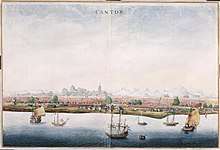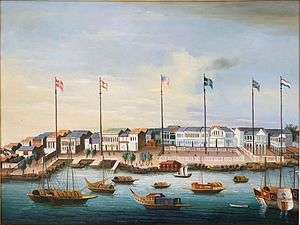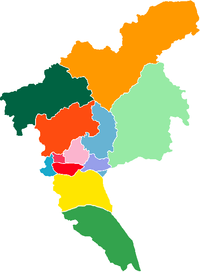Timeline of Guangzhou
The following is a timeline of the history of the Chinese city of Guangzhou, also formerly known as Panyu, Canton, and Kwang-chow.[1][2]
Nanyue
 | ||||||||
|---|---|---|---|---|---|---|---|---|
| ANCIENT | ||||||||
| Neolithic c. 8500 – c. 2070 BC | ||||||||
| Xia c. 2070 – c. 1600 BC | ||||||||
| Shang c. 1600 – c. 1046 BC | ||||||||
| Zhou c. 1046 – 256 BC | ||||||||
| Western Zhou | ||||||||
| Eastern Zhou | ||||||||
| Spring and Autumn | ||||||||
| Warring States | ||||||||
| IMPERIAL | ||||||||
| Qin 221–207 BC | ||||||||
| Han 202 BC – 220 AD | ||||||||
| Western Han | ||||||||
| Xin | ||||||||
| Eastern Han | ||||||||
| Three Kingdoms 220–280 | ||||||||
| Wei, Shu and Wu | ||||||||
| Jin 266–420 | ||||||||
| Western Jin | ||||||||
| Eastern Jin | Sixteen Kingdoms | |||||||
| Northern and Southern dynasties 420–589 | ||||||||
| Sui 581–618 | ||||||||
| Tang 618–907 | ||||||||
| (Wu Zhou 690–705) | ||||||||
| Five Dynasties and Ten Kingdoms 907–979 |
Liao 916–1125 | |||||||
| Song 960–1279 | ||||||||
| Northern Song | Western Xia | |||||||
| Southern Song | Jin | Western Liao | ||||||
| Yuan 1271–1368 | ||||||||
| Ming 1368–1644 | ||||||||
| Qing 1636–1912 | ||||||||
| MODERN | ||||||||
| Republic of China on mainland 1912–1949 | ||||||||
| People's Republic of China 1949–present | ||||||||
| Republic of China on Taiwan 1949–present | ||||||||
Imperial China
- 111 BCE – Panyu becomes a provincial capital of the Han Dynasty after the Han–Nanyue War as the Han expands southward.
- 226 CE – Panyu becomes the seat of Guang Prefecture ("Guangzhou").
- 401 – Guangxiao Temple first established as the "Baoen Guangziao" Temple.[3]
- 537 – Temple of the Six Banyan Trees built.
- 878–879 — Guangzhou massacre instigated by forces loyal to Huang Chao
- 1350 – Huaisheng Mosque rebuilt.[4]
- 1380 – Zhenhai Tower built.
- 1516 – Portuguese merchants arrive.[5]

View of Canton with merchant ship of the Dutch East India Company, c. 1665
- 1600 – Pazhou Pagoda built.
- 1619 – Chigang Pagoda built.
- 1684 – British East India Company in business.[6]

Painting of the Thirteen Factories c. 1820, with flags of Denmark, Spain, the U.S., Sweden, Britain, and the Netherlands
- 1821 – Xigutang literary society formed.[7]
- 1822 - Fire.[8]
- 1827 – The Canton Register, an English-language newspaper, begins publication.[9][10]
- 1832 – Jardine, Matheson and Co. in business.
- 1834 – Wetmore & Co. in business.[11]
- 1835 – The Canton Press, an English-language newspaper, begins publication.[9]
- 1840 – Augustine Heard and Company in business.[11]
- 1841
- February 27: Battle of First Bar.
- March 2: Battle of Whampoa.
- March 18: Battle of Canton
- May: Second Battle of Canton.
- 1842 – City designated a treaty port under the Treaty of Nanking.[6]
- 1848 – Apostolic Vicariate of Guangdong-Guangxi established.
- 1856
- British/French occupation begins.[6]
- Thirteen Factories set on fire.[11]
- 1859 – Shameen Island divided into French and British concessions.[6]
- 1861 – British/French occupation ends.[6]
- 1863 – Sacred Heart Cathedral built.
- 1866 – Yu Yin Shan Fang garden laid out.[12]
- 1879
- 1894
- Plague (3rd Pandemic).
- Chen Clan Academy built.
- 1895 – First Guangzhou uprising
- 1908 – Guangzhou North Railway Station opens.
- 1911
- Kowloon–Canton Railway begins operating.
- Second Guangzhou Uprising
Republic of China
- The Shakee Massacre on June 23, 1925 resulted in over two hundred casualties due to gunfire by British, French and Portuguese forces in Shaji (called Shake in Cantonese)
- 1918 – Urban council established.
- 1923
- June: National Congress of the Communist Party of China held in Guangzhou.[14]
- Kuomintang in power.[15]
- 1924
- Peasant Movement Training Institute and Whampoa Military Academy open.
- Canton Merchant Volunteers Corps Uprising.
- National Kwangtung University established.
- 1927 – December 11–13: Communist uprising.[16]
- 1931 – Sun Yat-sen Memorial Hall built.
- 1932
- Guangzhou Baiyun Airport opens in Baiyun District.
- Guangzhou Conservatory of Music founded.
- 1933 – Haizhu Bridge constructed.
- 1936
- Canton–Hankou Railway begins operating.
- Population: 1,122,600 (estimate).[6]
- 1938 – October 21: Japanese occupation begins.[6]
- 1945 – September 16: Japanese occupation ends.[17]
- 1949
- Nationalist government under the acting president Li Zongren relocates to Guangzhou.
- Nanfang Daily newspaper begins publication.
People's Republic of China
- 1949
- October: Communist forces enter city.
- Radio Guangdong begins broadcasting.
- 1952 – Guangzhou Daily newspaper begins publication.
- 1954
- Guangzhou Evergrande Football Club formed.
- South China Institute of Botany active.[18]
- 1956 – Guangzhou University of Chinese Medicine founded.
- 1957
- Beijing–Guangzhou Railway in operation.
- Canton Fair begins.
- Guangzhou Symphony Orchestra founded.
- Population: 1,840,000.[19]
- 1958
- Guangzhou Academy of Fine Arts in operation.
- Jinan University relocates to Guangzhou.
- 1959 – Guangdong Provincial Museum founded.
- 1964 – Population: 3,031,486.[20]
- 1967 – Renmin Bridge built.
- 1981 - Sister city relationship established with Los Angeles, USA.[21]
- 1982
- Guangzhou Library and Liyuan Poetry Society established.[22]
- Population: 3,181,510 city; 5,669,640 urban agglomeration.[23]
- 1983 – Mausoleum of the Nanyue King discovered.[24]
- 1984
- Guangzhou Economic and Technological Development Zone established.
- City designated sub-provincial city administrative status.
- Southern Weekly newspaper begins publication.
- 1985
- Zhujiang Brewery begins operation.
- Guangzhou Bridge built.
- 1988
- Haiyin Bridge built.
- Museum of the Mausoleum of the Nanyue King opens.
- 1990
- Guangdong International Building constructed.
- Avon begins hiring ladies in Guangzhou.[25]
- Population: 6,299,943.[26]
- 1991
- Guangzhou TV Tower erected.
- November: 1991 FIFA Women's World Cup held.
- 1992 – Guangzhou Free Trade Zone established.[27]
- 1996 – Guangzhou East railway station opens.
- 1997
- Guangzhou Metro begins operating.
- CITIC Plaza and Humen Pearl River Bridge built.
- Southern Metropolis Daily begins publication.
- Xiangjiang Safari Park opens.
- 1998 – Hedong Bridge, Jiangwan Bridge, Jiefang Bridge, and Huanan Bridge open.
- 2000 – Yajisha Bridge opens.
- 2001
- Guangdong Olympic Stadium opens.
- November: Chinese National Games held in Guangzhou.
- 2002
- 2003
- Zhang Guangning becomes mayor.
- Pazhou Bridge opens.
- 2004
- Guangzhou Baiyun International Airport opens in Huadu District.
- Guangzhou Higher Education Mega Center built.
- Guangzhou International Women's Open tennis tournament begins.
- 2006 – Chime-Long Paradise amusement park in business.
- 2008 – Huangpu Bridge and Xinguang Bridge open.
- 2009 – Liede Bridge opens.
- 2010
- Canton Tower and Guangzhou International Finance Center built.
- November: 2010 Asian Games held.
- Guangzhou Opera House, Guangdong Museum, and Guangzhou South Railway Station open.
- Wan Qingliang becomes mayor.
- Guangzhou Television Cantonese controversy.
- Guangzhou Bus Rapid Transit system launched.[29]
- 2011
- Guangzhou–Zhuhai Intercity Railway begins operating.
- Pearl River Tower built.
- Chen Jianhua becomes mayor.
- 2012 – Leatop Plaza and The Pinnacle built.
- 2013 - Air pollution in Guangzhou reaches annual mean of 48 PM2.5 and 72 PM10, more than recommended.[30]
See also
- Guangzhou history
- List of administrative divisions of Guangzhou
- Mayor of Guangzhou
- List of newspapers in Guangdong
- List of universities and colleges in Guangzhou
- List of historic buildings in Guangzhou
- List of tallest buildings in Guangzhou (sortable by date)
- Eight Sights of Guangzhou
- Major National Historical and Cultural Sites (Guangdong) in Guangzhou
- Southward expansion of the Han Dynasty
- Other names of Guangzhou
- Urbanization in China
Notes
- EB (1878), p. 37.
- EB (1911), p. 218.
- IDHP (1996).
- ArchNet.org. "Guangzhou". USA: MIT School of Architecture and Planning. Archived from the original on 7 October 2012. Retrieved 14 March 2013.
- Szczesniak (1956).
- Webster's (1960).
- Hiromasa (1986).
- Chronologies (1990), "Fires".
- "Guangzhou Newspapers", WorldCat, Online Computer Library Center, retrieved 14 March 2013
- Slade, John (1835), Canton Register, Vol. VIII
- Farris (2007).
- Keswick (2003).
- Lo & al. (1977).
- Dictionary of the CCP (2012), p. 15.
- Paulès (2009).
- Dirlik (1997).
- CCAHC (2000).
- "Garden Search: China". London: Botanic Gardens Conservation International. Retrieved 30 September 2015.
- United Nations Department of Economic and Social Affairs, Statistical Office (1976). "Population of capital city and cities of 100,000 and more inhabitants". Demographic Yearbook 1975. New York. pp. 253–279.
Canton
- "部分年份城乡人口分布", 广东省志:人口志 (in Chinese), Local Records Office of Guangdong, retrieved 4 August 2011
- "Sister Cities of Los Angeles". City of Los Angeles. Retrieved 30 December 2015.
- Lam (2007).
- United Nations Department of Economic and Social Affairs, Statistical Office (1987). "Population of capital cities and cities of 100,000 and more inhabitants". 1985 Demographic Yearbook. New York. pp. 247–289.
- "Guangzhou", China, Lonely Planet, retrieved 14 March 2013
- Kristof, Nicholas (3 May 1992), "Guangzhou: Let a Thousand Lipsticks Bloom", New York Times
- 广州市商业网点发展规划主报告(2003—2012) (PDF), Beijing: Department of Market System Development, Chinese Ministry of Commerce, retrieved 4 August 2011
- UN (2005).
- "China". Art Spaces Directory. New York: New Museum. Retrieved 2 December 2013.
- Komanoff, Charles (15 March 2010), "Postcard From a Guangzhou Traffic Jam", New York Times
- World Health Organization (2016), Global Urban Ambient Air Pollution Database, Geneva
References
- John Stewart Bowman, ed. (2000), Columbia Chronologies of Asian History & Culture, Columbia University Press.

- Douglas, Robert Kennaway (1911), , in Chisholm, Hugh (ed.), Encyclopædia Britannica, 5 (11th ed.), Cambridge University Press, pp. 218–220.
- Sullivan, Lawrence R. (2012), Historical Dictionary of the Chinese Communist Party, Scarecrow Press, ISBN 978-0-8108-7225-7.
- Schellinger; Salkin, eds. (1996), International Dictionary of Historic Places: Asia and Oceania, Routledge, ISBN 9781884964046
- Wetterau, Bruce (1990), New York Public Library Book of Chronologies, New York: Prentice Hall, OL 1885709M.
- Webster's Geographical Dictionary, Springfield: G. & C. Merriam Co., 1960, OL 5812502M.
- Dirlik, Arif (1997), "Narrativizing Revolution: The Guangzhou Uprising (11-13 December 1927) in Workers' Perspective", Modern China, 23
- Farris, Jonathan A. (2007), "Thirteen Factories of Canton: An Architecture of Sino-Western Collaboration and Confrontation", Buildings & Landscapes, 14
- Hiromasa, Inoue (1986), "Wu Lanxiu and Society in Guangzhou on the Eve of the Opium War", Modern China, 12
- Keswick, Maggie (2003), The Chinese Garden, Frances Lincoln Publishers, ISBN 9780711220317
- Lam Lap (2007), "The Revival of Classical-Style Poetry Writing: A Field Study of Poetry Societies in Guangzhou", Chinese Literature: Essays, Articles, Reviews, 29
- Lo Chor-Pang Pannell, Clifton W.; Welch, Roy (1977), "Land Use Changes and City Planning in Shenyang and Canton", Geographical Review, 67.
- Paulès, Xavier (2009), "Opium in the City: A Spatial Study of Guangzhou's Opium Houses, 1923–1936", Modern China, 35
- Szczesniak, Boleslaw (1956), "Pictorials of Contempt: A Note on the British in Mid-19th Century Canton", Monumenta Serica, 15
- United Nations (2005), Free Trade Zone and Port Hinterland Development, United Nations Publications, ISBN 9789211204346.
Attribution This article incorporates information from the Chinese Wikipedia, Dutch Wikipedia, and the Japanese Wikipedia.
External links
| Wikimedia Commons has media related to Guangzhou. |
- Items related to Guangzhou and Canton, various dates (via Europeana).
- "(Works related to Guangzhou)". V&A Collections. London: Victoria and Albert Museum.
- Items related to Guangzhou and Canton, China, various dates (via Digital Public Library of America).
This article is issued from Wikipedia. The text is licensed under Creative Commons - Attribution - Sharealike. Additional terms may apply for the media files.

